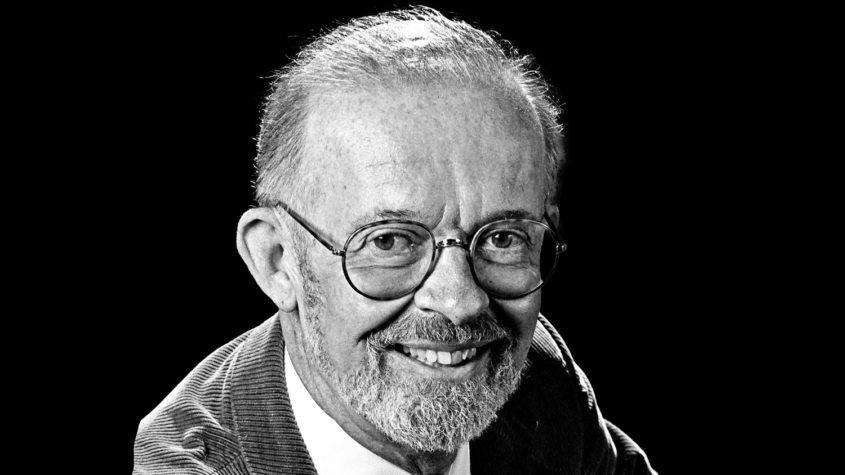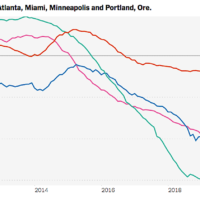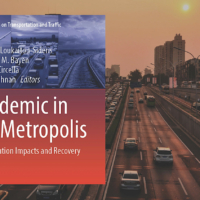In Memoriam: Leland S. Burns, Emeritus Professor of Urban Planning Scholar of housing economics and policy, both domestic and international, often focused on low-income housing
By Stan Paul
Leland S. Burns, UCLA emeritus professor of urban planning and a preeminent scholar of housing economics and policy, passed away at his home in Santa Monica on May 16, 2021. He was 87.
Burns, who came to UCLA seven decades before as an undergraduate student, became renowned in the United States and internationally for his work and research, which often focused on low-income housing. He was a prolific author of influential books in his field and published “The Housing of Nations” in 1977 with the late Leo Grebler, a UCLA professor of urban land economics who is considered the father of modern housing economics and housing policy.
“The book was the first international, econometric study of housing and led to much further research on the topic,” said Donald Shoup, distinguished research professor of urban planning at the UCLA Luskin School of Public Affairs and a longtime friend and colleague of Burns.
Other notable titles during Burns’ long and productive career include “The Future of Housing Markets, a New Appraisal” (1986), also co-written with Grebler, and “The Art of Planning: Selected Essays of Harvey S. Perloff ” (1985), co-edited with John Friedmann.
Burns was born in Osage, Iowa, in 1933 and came to UCLA in 1951, earning a bachelor’s in business administration in 1955, followed by an MBA in 1957. He was a Fulbright Scholar in the Netherlands and completed his Ph.D. in economics in 1961 from the Netherlands School of Economics, now Erasmus University, in Rotterdam. The same year he began teaching urban land economics at what is now the UCLA Anderson School of Management.
He later became one of the first faculty members in UCLA’s newly formed Graduate School of Architecture and Urban Planning, where the late Harvey Perloff became dean in 1968. There, Burns held a number of leadership positions, including associate dean from 1969 to 1971 and again in 1986 as acting associate dean. He also held numerous UCLA and departmental academic administration and advisory posts, including membership on UCLA’s Committee on Academic Personnel.
Burns had a close association with Cambridge University, where he lectured for 10 years in the Department of Land Economy and was a research scholar for three decades. At Cambridge, he was a Fellow Commoner of St. Edmunds College. Throughout his career, he also held a number of research and visiting scholar appointments at institutions such as UC Berkeley and at universities in Austria, Scotland and Japan.
Burns also served as a consultant and member of numerous public agencies, commissions and boards. They include the U.S. Public Health Service, the National Science Foundation, the National Academy of Sciences, the U.S. Department of Housing and Urban Development and the Federal Highway Administration of the U.S. Department of Transportation.
He served as a consultant to the Los Angeles Regional Transportation Study for the California State Division of Highways, as well as on President Lyndon B. Johnson’s Committee on Urban Housing. Other appointments included the Economic Commission for Europe, Economic and Social Council, United Nations, Geneva; the Office of Planning and Research of the Governor of the State of California; the Coastal Conservancy; and many other government and civic entities.
He was a referee for several academic publications, including American Economic Review, Urban Studies and California Management Review, plus manuscripts for the University of California Press. From 1983-89 he was the associate editor of Urban Studies and served on the editorial board for many years.
Another of Burns’ many achievements was the house he had built in Santa Monica Canyon in 1974, Shoup said. Burns commissioned internationally renowned architect Charles Moore, who was then chair of UCLA’s Architecture Department, to design the house
“An outstanding feature of the house is the baroque pipe organ that Lee played well and often,” Shoup said, adding, “Lee was a fine musician and was connected in musical circles in the United States and Europe.”
Burn was a former colleague and friend of Dolores Hayden, professor emerita of architecture, urbanism and American studies at Yale who also formerly taught at UCLA. “He was always ready to talk through a research question about economics, planning or design.”
Students who were advised by and studied as master’s and doctoral students with Burns went on to become leaders in and out of the field of urban planning. He was doctoral dissertation chair for Kathleen M. Connell Ph.D. UP ’87, who was elected as California state controller in 1995.
He also served as academic advisor to Bish Sanyal Ph.D. UP ’84, who went on to work at the World Bank and is now a professor at the Massachusetts Institute of Technology.
Sanyal said that Burns’ “mentorship, generosity and friendship” played a large part in his professional career, which includes serving as head of MIT’s Department of Urban Studies and Planning and later as chair of the entire MIT faculty.
“I will miss Lee, and will remember his gentle smile — but rigorous professional standards — which helped me become who I am today,” Sanyal said.










Leave a Reply
Want to join the discussion?Feel free to contribute!